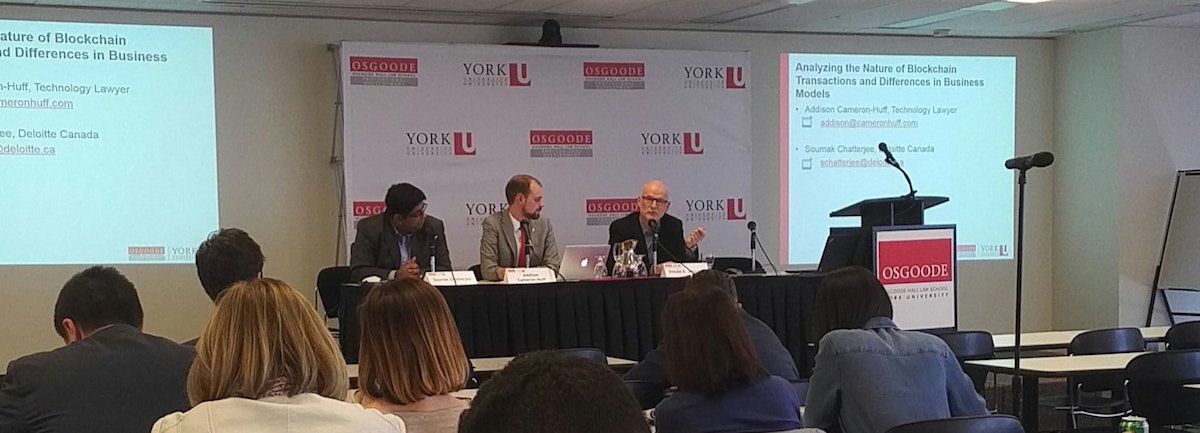On March 20th Donald Johnston (Aird & Berlis) and I ran an event with OsgoodePD titled Critical and Emerging Issues in Blockchain Law
. This is my recap of what was covered.
Panel 1: Opportunities for Blockchain in the Settlement System
Anne Butler (GC for Payments Canada) provided an overview of Project Jasper
. Project Jasper is a blockchain experiment run jointly by the Bank of Canada, Payments Canada, R3, and several Canadian banks, with the aim of seeing how the Large Value Transfer System (LVTS) could be transitioned to a blockchain system. As part of explaining the results of Project Jasper, Anne walked the audience through the Canadian payments space.
Following Anne’s explanation of LVTS and Project Jasper, McCarthy Tetrault partner Ana Badour provided an overview of Canadian payments regulation and international principles for payments systems. Co-panelist Peter Todd (Bitcoin core developer and consultant) then explained the technological principles of a good payments system, and the lessons of Bitcoin.
The panelists provided three different viewpoints: top-down (Anne Butler), regulated entities (Ana Badour), and system development (Peter Todd).
Anne Butler concluded by describing what they’re planning for Phase 2 of Project Jasper, based on the lessons learned to-date. Peter Todd concluded by explaining how it could be possible to have a collateral-free future. Ana Badour concluded with a warning about contagion risk in financial systems.
Panel 2: Initial Coin Offerings
The second panel of the day focused on the emerging concept of Initial Coin Offerings
(ICO). Marco Santori (partner at US law firm Cooley LLP) began with an explanation of what an ICO is and why they’ve become a popular method of funding/raising awareness about early stage companies in the blockchain space. Kathleen Ritchie, partner at Canadian firm Gowling WLG, then explained the basics of securities law as a starting point for analyzing ICOs.
Pat Chaukos from the Ontario Securities Commission described her practical approach
to the prospectus and registration requirements of securities laws. Prescriptive requirements
, namely certain forms, are the rules that she sees being modernized in the future, and hopes that the initiative at the OSC that she leads, OSC Launchpad, will help will this.
Marco and Kathleen ran through what’s happened to-date with ICOs, and why many of them are in danger of falling afoul of securities laws. Both panelists pointed out that there’s been no case law on ICOs in either Canada or the United States, and the mandate of regulators to protect the public.
Omar Solimon (from Canadian firm Stikeman Elliott) stressed the importance of substance over form in securities laws.
Marco concluded with a report on the status of Delaware’s corporate law changes to enable blockchains for share registries.
Lunch Break: Tech Primer + Q&A
Donald Johnston, partner at Aird & Berlis, and blockchain expert Jeff Coleman (Ledger Labs) gave a lunchtime primer on the technology of blockchain. Topics included: proof of work, proof of stake, private blockchains, distributed ledgers, dedicated purpose blockchains, cryptographic economics of blockchain systems, data structures, and hashing functions.
Panel 3: Smart Contracts
The third panel of the day covered a topic that many people talk about but few understand: smart contracts. The panelists were Pulat Yanusov (commercial litigator), Josh Stark (technologist & former lawyer), and Mat Cybula (CEO of Cryptiv).
Josh began the talk by describing the history of smart contracts, beginning with the writings of Nick Szabo in the 1990s, and moving on to some of the systems being deployed today. As an example of a possible smart contract system, Josh described a hypothetical smart contract for interest rate swaps, and why this would be an improvement on today’s contracts.
Mat compared today’s smart contract/blockchain developments to the early days of the Internet. He described three different blockchain-based smart contract systems: Golem, MelonPort and Augur.
Pulat provided the litigator’s perspective on smart contracts, and the different viewpoint of technology people (programmers, entrepreneurs) and legal people (regulators, judges, etc.). Much of his talk was about the interfaces of our existing legal system and the smart contract future that’s being developed. He concluded by explaining that the legal system is not necessary for smart contracts to thrive: products will arise that will mitigate risk technologically, not with lawyers
.
Mat concluded the panel with his thoughts on the legal system evolving to take into account smart contracts.
Panel 4: Analysing the Nature of Blockchain Transactions & Business Models
The final panel of the day was on the topic of blockchain business models and transactions.
The first speaker, Bitcoin/blockchain lawyer Addison Cameron-Huff, described the diversity of blockchain business models and the importance of analyzing transactions carefully to understand the legal implications. His key takeaway for the audience was that the challenge lies in bridging the real and digital worlds (with insurance, compensation funds, contracts, etc.) He concluded with a run through of specific laws that often come up when he advises blockchain businesses.
Deloitte consultant Soumak Chatterjee gave his ground-level view of what’s happening in the financial industry, specifically SecureKey. He described innovation without regulator support as a science experiment
and stressed the importance of cooperation between technologists and regulators.
Donald Johnston (Aird & Berlis partner) added his thoughts to the panel on the topic of privacy & blockchain identity systems. Soumak explained the thinking that goes into designing an identity blockchain system, and where the opportunities for existing participants might be in a future blockchain world.
Conclusion
Brett Kenworthy from OsgoodePD wrapped up the day and gave the date for the rebroadcast: April 21st, 2017.
Photo & Event Credit
The image at the top of blog post was taken by Brett Kenworthy, the incredible staff organizer from OsgoodePD.

